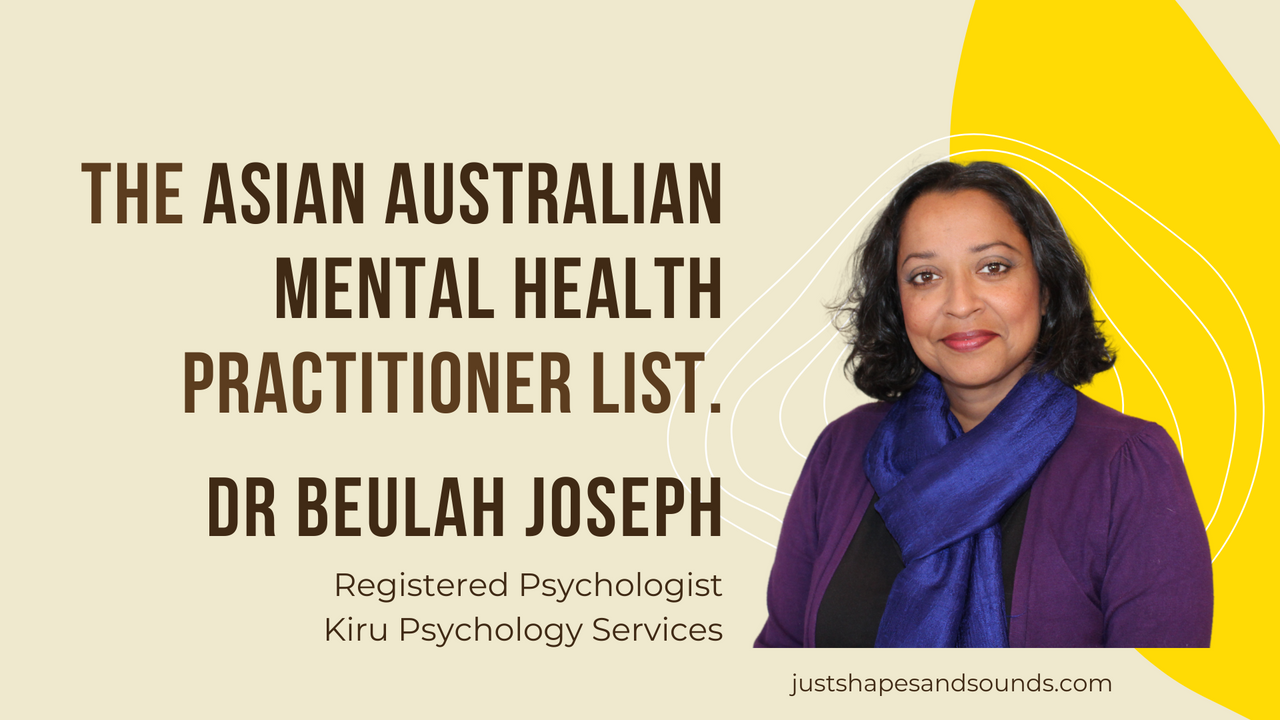Meet Asian Australian psychologist, Dr Beulah Joseph.
Sep 06, 2022
We know that it's not always easy trying to work out which therapist we might like to work with: Because the decision isn't just about where they're located and when they're available, but there's a bit more of a human, relational element to the decision too.
So here at Shapes and Sounds, we want to help make that process just a little easier.
Every month, we'll be introducing a therapist from the Asian Australian Mental Health Practitioner List to help you gain a bit more insight into who you feel might be a good fit for you or someone that you know.
This month we're excited to connect you with Dr Beulah Joseph who is a registered psychologist and principal psychologist at Kiru Psychology Services (located in Melbourne, and offers Telehealth sessions Australia wide). We hope you enjoy connecting with Dr Beulah below!
~
1. What led you to choosing psychology as a career?
I have always been interested in understanding people; what drives us, what holds us back. I've always enjoyed being part of someone's journey and facilitating growth and development. In Asian culture, psychology is not a popular profession and so it was not something I immediately thought about exploring. I started my professional career as a classroom teacher at both primary and secondary levels but later decided to change focus and devote my energies on working with adults and helping people lead happier, healthier lives. For me, psychology allows me to support someone in gaining a deeper understanding of themselves, affirm their value and worth as a person, help them shift from unhelpful thinking styles to a more values-aligned mindset. This is important work that I am passionate about.
2. What is your unique cultural heritage?
My family is originally from Sri Lanka though my parents and I were born in Singapore. I spent my first 17 years of life in Singapore before moving to Australia.
3. What are your areas of specialty and what kind of frameworks do you work from?
Having been a psychologist for quite some time, I have a broad base of experience to draw on and use a range of approaches including CBT, DBT, ACT, Mindfulness therapies, Interpersonal therapy, Emotion Focused Therapy, etc. I particularly enjoy working with grief/loss, life satisfaction, adjustment and transition, cultural issues, gender and identity issues, relationship issues, trauma, self esteem, anger management, anxiety and depression, stress, etc. I work collaboratively and my sessions are client driven. What works with one client may not work with another so I work with each client to adopt an approach that will be helpful in achieving their treatment goals.
4. What kind of clients are you best able to support?
I welcome clients who are interested in finding more effective ways of managing life's challenges and crafting a happier and healthier life.
5. f you could be your own therapist right now, what do you think you would say to yourself?
Breathe. All we have control over is this present moment.
~
Connect with Dr Beulah via our Asian Australian Mental Health Practitioner List HERE.
Alternatively, if you feel like Dr Beulah may be a good fit for someone that you know, be sure to forward this page on to them too. Let us continue to not only support ourselves but all those around us too!
If you require urgent assistance, please do not contact Dr Beulah or any of the practitioners on this list. Instead, please call emergency services on 000 or call Lifeline on 13 11 14.
Shapes and Sounds does not recommend or endorse Dr Beulah Joseph or any of the practitioners listed on the Asian Australian Mental Health Practitioner List.
Please always consult your GP before making changes to your mental health care plan.
💡For community members:
We created the "Essential Guide for Asian Australian Mental Health" by surveying over 350 Asian Australians during Covid-19 lockdowns.
Download our guide and learn about the three most pertinent areas of concern for the Asian community, with tips and strategies to support you through.
🤝For mental health service providers:
Shapes and Sounds supports mental health organisations and teams to feel confident and resourced in providing culturally-responsive care to the Asian community in Australia.
Download our information pack to learn more.
